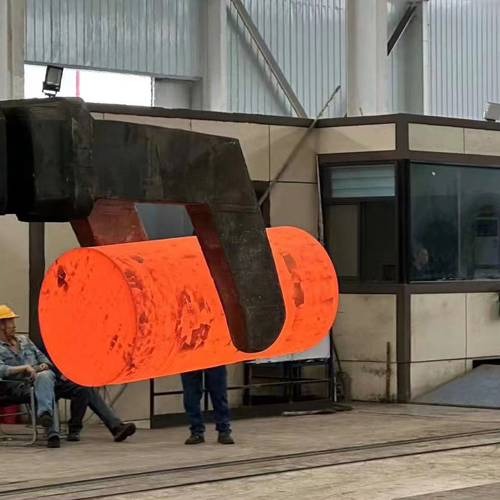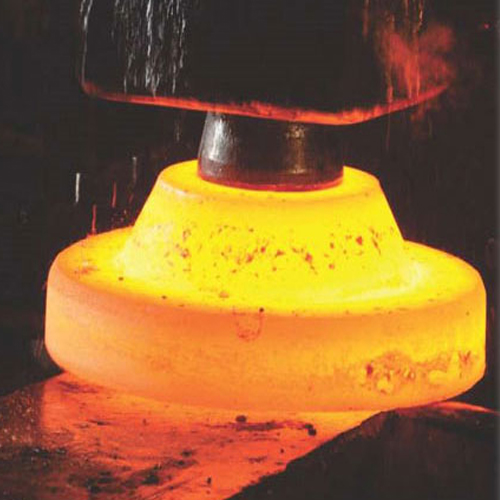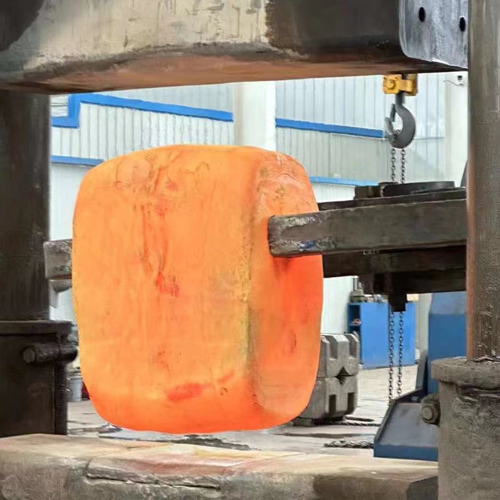Products >> Titanium >> Titanium forge

Size: NPS: 1/2"-36" pressure nominal: class 150#-2500#
Titanium flange contact face: flat face, raised face, male face, female face, groove face etc.
Test: ultrasonic test
Materia grade:
|
ASTM Grade |
Alloy |
DIN |
UNS |
|
Grade 1 |
Commercially pure |
3.7025 |
R50250 |
|
Grade 2 |
Commercially pure |
3.7035 |
R50400 |
|
Grade 3 |
Commercially pure |
3.7055 |
R50550 |
|
Grade 4 |
Commercially pure |
3.7065 |
R50700 |
|
Grade 5 |
Ti-6Al-4V |
3.7164/5 |
R56400 |
|
Grade 7 |
Ti-0.15Pd |
3.7235 |
R52400 |
|
Grade 9 |
Ti-3Al-2.5V |
3.7195 |
R56320 |
|
Grade 12 |
Ti-0.3Mo-0.8Ni |
3.7105 |
R53400 |
|
Grade 23 |
Ti-6Al-4V ELI |
R56407 |
Titanium forge applications:
Many industries including aerospace, marine shipbuilding, and military/defense rely on forged titanium for various industrial and production-based uses.
The high strength-to-density ratio of forged titanium alloys and the metal’s significant corrosive resistant properties. Both of these characteristics result in a durable, versatile, and reliable material that can work well on land, in the air, and even in the sea, and contributes to the high demand for titanium forge.
the following is a quick overview of some processes used for forging titanium alloys, including the impact of different forging temperatures on the finished product.

The Titanium Forging Process
Some of the different processes used for titanium forge include:
- Open Die Forging – Blank titanium material is deformed and pressed into shape in the cavity between two molds. These molds do not completely encapsulate the material but instead provide a narrow gap through which excess material can flow out. When in the cavity, the titanium is repeatedly stamped until the desired shape is achieved.
- Closed Die Forging – Also known as impression die forging, this method uses compression under high pressure to shape a heated titanium blank. The blank is covered either in full or in part by the dies, which move toward each other from top to bottom to achieve the required form.
- Free Forging – Small and/or simple orders may be accomplished with free forging, a titanium forging method that is performed between two flat dies without an inner cavity. It is a relatively inexpensive and flexible method, but due to high labor requirements, it’s not the most common way to forge large amounts of titanium metal.
- Isothermal Forging – A process by which the starting material and the die are heated to an equal and highly controlled temperature to achieve high deformation rates with minimal pressure

Other types of titanium alloy forging, such as multi-direction die forging, extrusion die forging, partial die forging, and rolled ring forging rely on similarly unique alignments of heat, pressure, and die used to achieve desired shapes. It’s important that the proper process is used, and that the plasticity of the material and the necessary end result are both taken into account.
Effects of Titanium Forging Temperature
Hot forging is more common than cold forging, though the latter can be cheaper and more environmentally friendly. Notably, lower temperatures (below 1650 degrees Fahrenheit) are only suitable for non-alloyed titanium, while higher temperatures are a requirement for alloyed titanium.
It’s not just the temperature of the titanium itself that is essential during forging. The dies’ temperature must also be controlled since excessive heat loss or variations in heat will lead to defective parts.
The importance of temperature in the titanium forging process is primarily related to the metal’s structural elements at various heat levels. By forging with the correct heat levels of starting material and dies, the forger can create a more robust and more reliable end product—one that is structurally suitable for the job at hand.
The Strength and Versatility of Titanium Forging
Titanium forging is a manufacturing process that involves shaping titanium alloys through the application of heat and pressure. This process offers several advantages over other methods of titanium fabrication. In this article, we will explore the benefits of titanium forging and why it is a preferred choice in various industries.
The Strength of Titanium Forging
High Strength-to-Weight Ratio
- Titanium forging offers a high strength-to-weight ratio, making it ideal for applications where weight reduction is crucial.
- This property allows for the creation of lightweight components without compromising on strength and durability.
Excellent Corrosion Resistance
- Titanium alloys have exceptional corrosion resistance, even in harsh environments.
- This makes titanium forging suitable for applications in marine, aerospace, and chemical industries, where exposure to corrosive substances is common.
Superior Fatigue Strength
- Titanium forging exhibits superior fatigue strength, making it resistant to cracking and failure under repeated stress.
- This property makes it suitable for components subjected to cyclic loading, such as aircraft landing gears and engine parts.
The Versatility of Titanium Forging
Wide Range of Applications
- Titanium forging finds applications in various industries, including aerospace, automotive, medical, and sports equipment.
- It is used to manufacture components such as aircraft parts, surgical implants, automotive engine components, and golf club heads.
Machinability and Weldability
- Titanium forging offers good machinability, allowing for the creation of complex shapes and intricate designs.
- It is also weldable, enabling the joining of titanium components through various welding techniques.
Temperature Resistance
- Titanium alloys have excellent temperature resistance, retaining their strength and integrity at high temperatures.
- This property makes titanium forging suitable for applications in high-temperature environments, such as gas turbines and heat exchangers.
Titanium forging offers a combination of strength and versatility that makes it a preferred choice in various industries. Its high strength-to-weight ratio, corrosion resistance, and fatigue strength make it suitable for demanding applications. Additionally, its versatility in terms of applications, machinability, weldability, and temperature resistance further enhance its appeal. As technology advances, titanium forging is expected to continue playing a significant role in the manufacturing of high-performance components.
Contact Us

Name: Mr. Ren
Tel: +86-18292471213
E-mail: info(at)intemetal.com
Add: Middle Section Baotai Road, Weibin District, 721013, Baoji, Shaanxi Province, China







